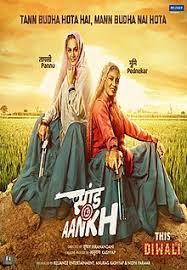
Saand Ki Aankh
Starring Bhumi Pednekar, Tapsee Pannu,Prakash Jha, Vineet Kumar Singh
Directed by Tushar Hiranandani
There is plenty of preaching in this wackily entitled film. And yet Saand Ki Aankh hits bull’s eye. All the rhetorics and sermonizing thrown at the pig-headed annoyingly imbecilic men in this film—and the moronic men’s brigade is led by ‘Dadaji’ Prakash Jha who smirks at the womenfolk in his sprawling family and smokes hookah in the same breath—are richly deserved.
These men, so carictural in their patriarchal pursuits and perversities deserve to be killed with sermons. And Bhumi-Tapsee playing sisters-in-law kill it. Though Tapsee’s old-woman act is not fully supported by her makeup, both she and Bhumi shine as sisters-in-arms, hiding a guilty secret from the men who remain blinded by their entitlement and arrogance till the end. And when Tapsee taunts them towards the end for lording over the women although they (the women) keep the kitchen fires burning, I felt like giving both the ladies a joint gold medal for shooting so sharply without physical guns.
When they are not cooking or plotting, Chandro (Bhumi Pednekar) and Prakashi (Tapsee Pannu) sneak away from the environment of oppression to …well….to shoot. Not films. God forbid! But guns at tournaments. Based on the life of two real-life champion sharpshooters (whom we get to meet at the end of the movie) the film really comes alive when the two ladies are at tournaments facing smirks and jibes. Guided by their incredibly devoted and supporting coach Yashpal (Vineet Kumar, excellent) Chandro and Prakashi are all blazing guns and belatedly claimed glory.
There is a moment when a young upstartish journalist at a tournament asks the two star-shooters what they ate to make them so exuberant at their age. “Gaali,” says the straightfaced Tapsee who has the less rabblerousing lines. Indeed Tapsee like a good co-star, allows Bhumi to take center stage during most of their shared moments of salvaged sisterhood. In makeup that makes her resemble the late actress Lalita Pawar, Bhumi Pednekar gets most of her lines and feelings right.
Eventually, the temptation to preach about the plight of gifted rural women who often end up smothering their true instincts and burning them in the kitchen chulha, gets the better of the narrative’s more delicate ambitions.
Nonetheless, the film is remarkably strong in conveying the sense of emasculated power that women with outstanding talent feel in a patriarchal community. The background score is, for a change, apt. So are the nostalgic references such as Mehboob’s Mother India and Akshay Kumar’s Khiladi phase. These references lend authenticity to the goings-on even while reminding us how cinema has gone from the sublime to the…well, you know the rest.








